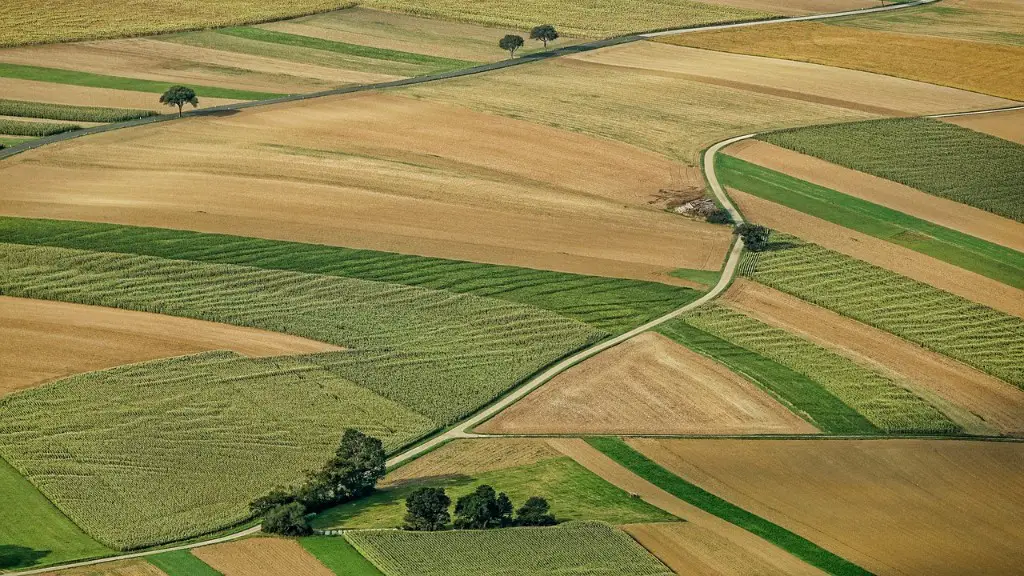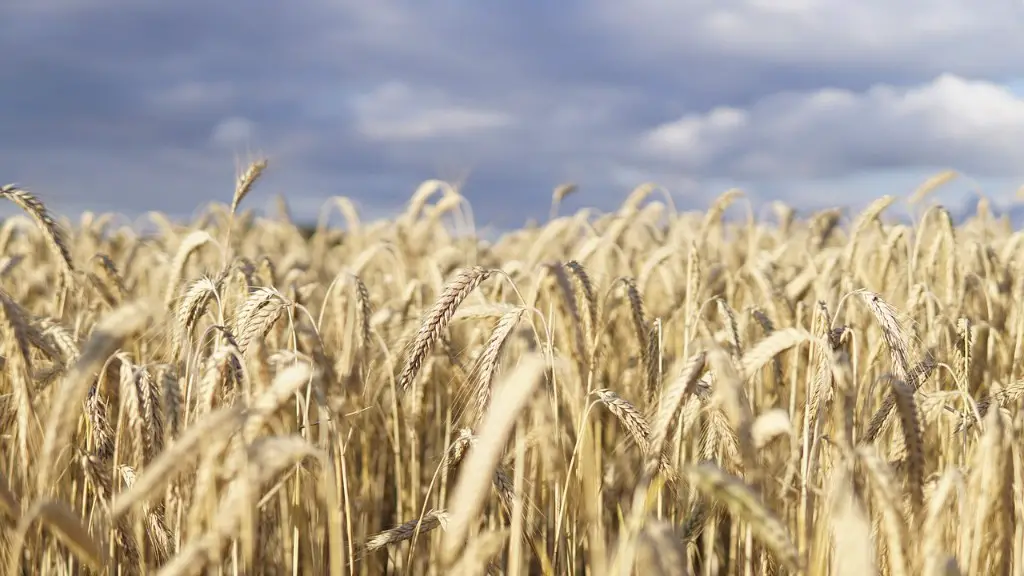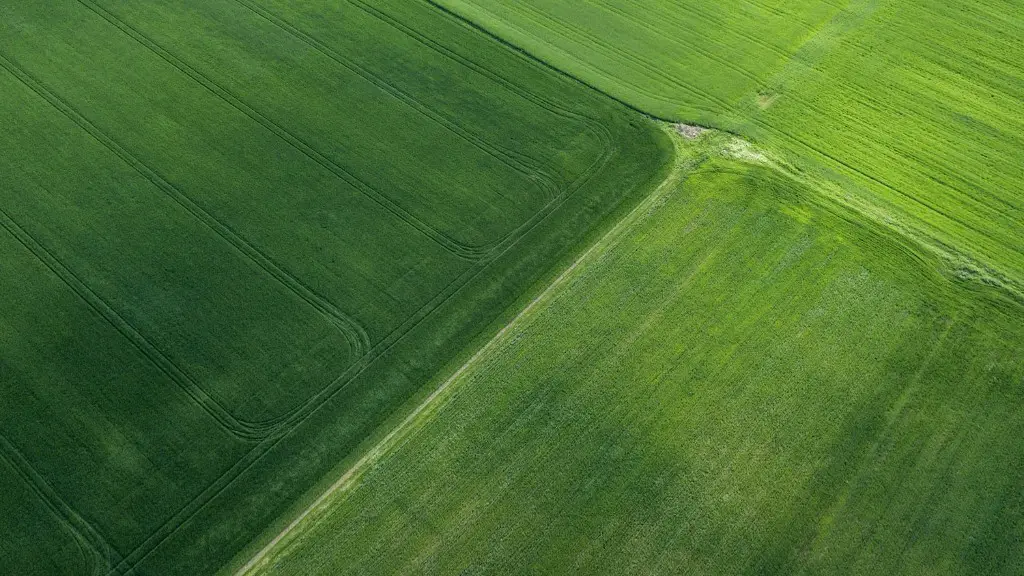Over the past decade, agriculture has been one of the most important sectors in terms of contribution to economic growth. The sector has been a key driver of rural development and poverty alleviation, and has played a significant role in food security. In addition, agriculture has also been an important source of foreign exchange earnings and employment.
Agriculture is helpful in economic growth because it provides food, fiber, and other products for people to consume. It also creates jobs for people who work in the agricultural sector. Additionally, agriculture can serve as a source of revenue for governments through taxes and other fees.
How does agriculture improve the economy?
Agriculture is a vital sector of the US economy, contributing to the overall gross domestic product (GDP) through farm production, forestry, fishing activities, textile mills and products, apparel and food and beverage sales, and service and manufacturing.
The agricultural sector directly employs over 1.1 million people, with over 22 million people employed indirectly in related industries. The sector also generates $135 billion in exports, making it a key driver of economic growth.
Despite its importance, the agricultural sector faces challenges such as volatile markets, rising costs, and environmental regulations. These challenges must be addressed in order to ensure the continued success of the sector and the US economy.
The government of India earns a significant amount of revenue from agriculture. The main sources of income are from rising land revenue and the movement of agricultural goods. This helps the government in revenue generation and also provides employment opportunities for the people of the country.
What are 3 benefits of agriculture
Agriculture is the backbone of human survival. Without it, we would not have the food, shelter, or clothing that we need to live. Raw materials for everything from food to clothing to shelter come from agriculture, and without it, we would be lost.
The agricultural sector is a key driver of economic growth and development. It is a major source of raw materials for industry, and an important contributor to international trade. Agriculture also plays a significant role in a nation’s revenue, providing employment and income for many people. In addition, agriculture is essential for a country’s development, as it can help to heal the environment and provide food security.
What is the main importance of agriculture?
Agriculture is the process of producing food, feed, fiber and other desired products by the cultivation of certain plants and the raising of livestock.
The history of agriculture dates back to the very beginning of human civilization. It is an ancient practice that has greatly impacted the world today. Agriculture is the main source of food for most people around the world. It is also a major source of income for many people, especially in developing countries.
There are many different types of agriculture, including subsistence agriculture, commercial agriculture, and industrial agriculture. Subsistence agriculture is the type of agriculture that is practiced in order to produce enough food to feed oneself and one’s family. Commercial agriculture is the type of agriculture that is practiced in order to produce food, fiber, or other products that can be sold in order to make a profit. Industrial agriculture is the type of agriculture that is practiced in order to produce large quantities of food, often using mechanized methods and chemicals.
Agriculture has many benefits. It helps to ensure that people have enough to eat, and it can also provide a source of income. In addition, agriculture can help to preserve the environment and to promote economic development.
However, agriculture also has some drawbacks. It can be
Agriculture is a vital sector of the economy and it is the backbone of the economy. It forms the basis for food and nutrition security and provide raw materials for industrialization. It is important to promote and support the agricultural sector in order to ensure the economic stability and growth of the country.
What are 5 reasons why agriculture is important?
Agriculture provides the raw materials for many industries, including cotton and jute fabric, sugar, tobacco, and edible and non-edible oils. agriculture also provides raw materials for other industries, such as processing of fruits and vegetables and rice husking. Therefore, agriculture is an important sector of the economy and should be supported.
The very poorest people benefit the most from agricultural growth through increased demand for their labor. Agricultural growth increases the probability of obtaining employment, and it may increase the salary level, thereby increasing the income that can be accrued from selling labor.
The social benefits for farm families are numerous and include a sense of achievement and fulfilment. Farm families get to see the direct effects of their work on the people who spend time on the farm. They also get to make a difference in the lives of individuals, often those who are excluded from mainstream society. This helps to create a more inclusive community.
Cow milk is the top agricultural product in 37 countries, followed by wheat in 14 countries and corn in 11 countries. Milk, wheat and corn are the most produced crops globally, with 11 billion, 7609 million and 7567 million tons respectively.
What are the impacts of agriculture to the society?
Agriculture has a profound impact on the environment. It is one of the leading causes of land degradation, water pollution and greenhouse gas emissions. Agricultural production often results in soil erosion, salinization and eutrophication. These problems are only exacerbated by the fact that agriculture is a major source of greenhouse gas emissions.
However, in recent decades, agricultural productivity in many developing countries has stagnated, while the rural population has continued to grow. This has led to a widening rural-urban divide and increased rural poverty. The government has a key role to play in addressing this issue, both in terms of policy and investment.
There are a number of reasons why agricultural productivity has stagnated in developing countries. First, smallholder farmers often lack access to quality inputs, Technologies, and extension services. Second, land tenure insecurity discourages long-term investments in productivity-enhancing practices. And finally, lack of infrastructurelimits market access for farmers.
The government can play a role in addressing each of these challenges. In terms of policy, the government can create an enabling environment for private sector investment in agriculture. This includes reforming land tenure laws and creating an enabling regulatory environment. In terms of investment, the government can invest in rural infrastructure, such as roads, irrigation, and storage facilities. And finally, the government can also invest in agricultural research and extension services to help smallholder farmers access the latest technologies and best practices.
The government’s role in promoting agricultural productivity is critical to reducing rural poverty and narrowing the rural-urban divide. But it is important
How does agriculture improve the community
Community agriculture is a great way to get people of all ages involved in environmental issues and local politics. It can also help reduce stormwater runoff and air pollution, and increase biodiversity and species habitat.
Agricultural trade can be a tool to either mitigate or exacerbate inequalities depending on the specific measures taken. For example, if tariffs or quotas are put in place to protect domestic farmers, this can lead to higher prices for consumers and higher profits for farmers. This in turn can lead to greater inequality as the rich get richer and the poor get poorer. Alternatively, if export taxes are lowered in order to make agricultural products more competitive internationally, this can lead to higher wages for farmers and more employment in the agricultural sector. This can help to reduce inequality as the poor are given more opportunities to earn a better living. Ultimately, it is up to policymakers to carefully consider the impacts of trade policy on inequality when making decisions.
What are three impacts of agriculture?
Agriculture is a critical sector that affects the environment in a variety of ways. While it is important for providing food and other resources, it can also lead to soil erosion, water pollution, and deforestation. Additionally, agriculture can contribute to climate change by releasing greenhouse gases into the atmosphere. While there are many negative impacts of agriculture on the environment, there are also some positive ones. For example, agriculture can help to sequester carbon in the soil, which can offset greenhouse gas emissions. Additionally, sustainable and organic farming practices can help to improve the quality of the environment.
There is a need to develop high-yield crops in order to increase food production. This can be done by improving irrigation facilities, increasing the use of fertilizers, and improving market access. Additionally, it is important to adopt genetically modified (GM) crops and to reform land ownership with productivity and inclusiveness in mind.
Warp Up
Agriculture plays a vital role in the economic growth of a country. It provides employment opportunities to a large section of the population and is a source of food and raw materials for industries. Apart from this, agriculture also provides foreign exchange earnings for the country through exports.
The agricultural industry is a vital part of any economy. It provides the raw materials that are necessary for many industries, including the food and beverage industry, the manufacturing sector, and the construction industry. The agricultural sector also provides employment opportunities for many people. In conclusion, agriculture is helpful in economic growth because it provides the raw materials that are necessary for many industries and it also provides employment opportunities for many people.




